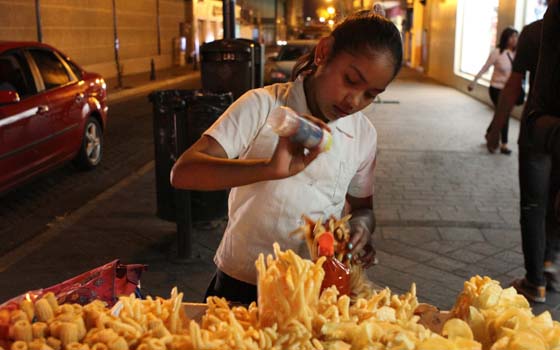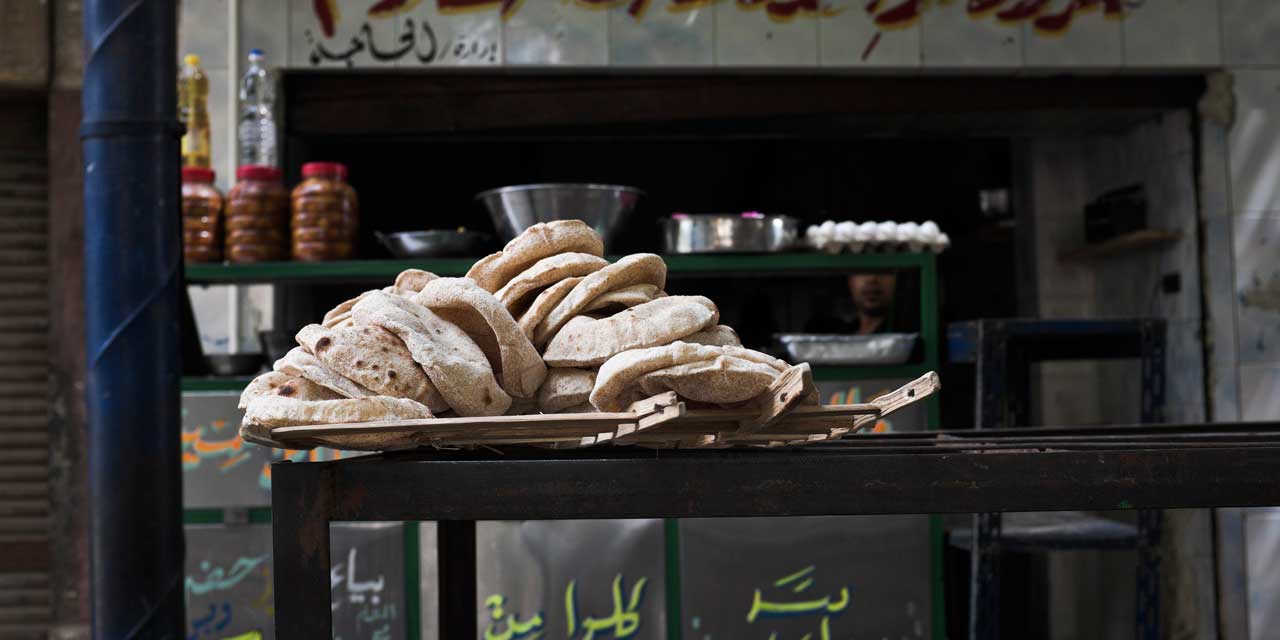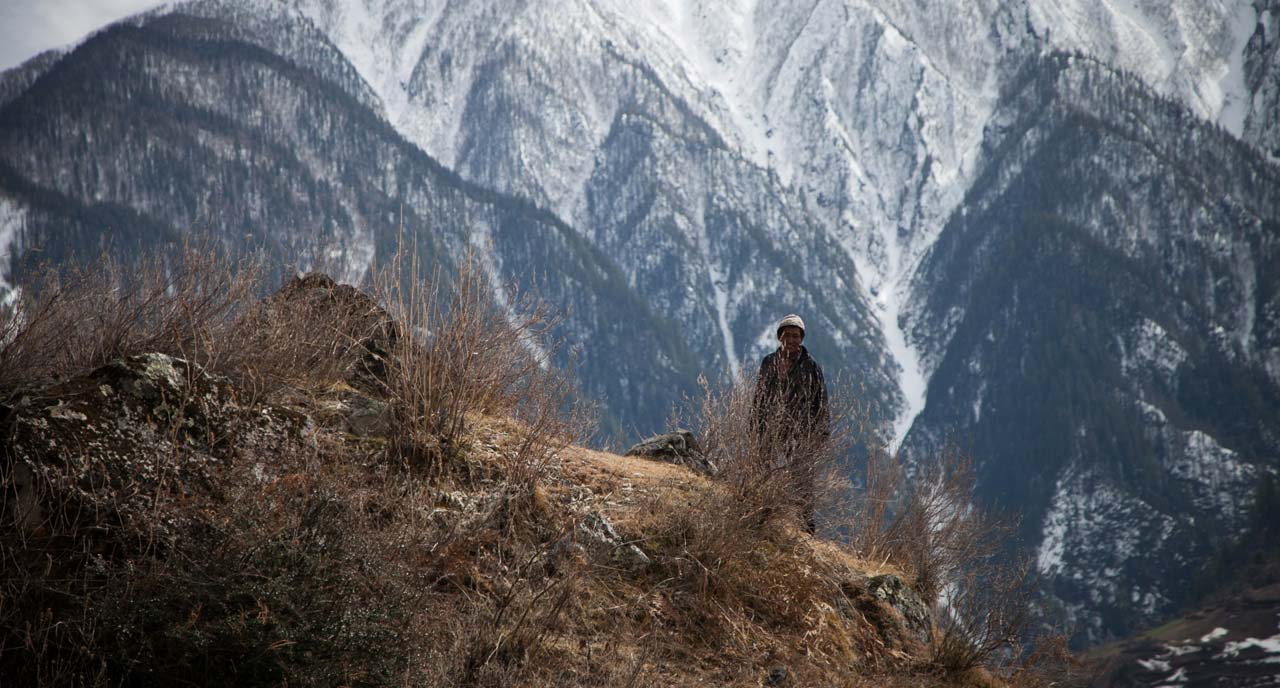In this issue, we feature stories focused around a global common denominator: Food. In nine countries on five continents, our team of reporters found numerous instances in which food and the circumstances surrounding its cultivation, sale and distribution has been tainted by corruption.

Fish in South Africa. Photo: Yolaan Begbie

Rice in a Nigerian Market. Photo: Yinka Adeparusi

Checking the label of a carton of milk. Photo: Stephanie Burnetti

A young man carries rice in Nepal. Photo: Rajneesh Bhandari

A street food vendor in Mexico City. Photo: Maria Paula Brito
This corruption has left people sick, hungry and distrusting. Collectively, these stories paint a picture of an increasingly complex global food system, where the scale necessary to provide enough food for consumers leaves room for corruption to seep into the supply.
For our correspondents in Mexico, independent journalists Andrea Arzaba and Maria Paula Brito, the experience of seeing street food vendors physically forced out of plazas and parks across Mexico City and Guadalajara left a mark. They dug into the drama and set out to explore the forces behind the street food that has made Mexico’s cuisine world-renowned. What they found was a complex fight that pits unlicensed food vendors against those authorized to serve on the streets. The tension has fed an intricate system of bribes and led to numerous charges of corruption by local leaders.
In Egypt, our reporting team, made up of independent journalist Anna Day and photographer Virginie Nguyen Hoang, explore the evolution of one of the pillars of the 2011 Egyptian Revolution: the demand for bread. They argue that Egypt has the potential to fulfill the supply needed to satisfy the domestic demand for subsidized bread, but that pervasive corruption in the country’s wheat market continues to create instability for the fragile new democracy and force dependence on more expensive foreign wheat.

Our correspondents in China and Lithuania, Stephy Burnett in Hong Kong and Domas Burkauskas in Vilnius, both followed up on instances of food sickening children at schools, and found that many details remain shrouded in secrecy.
In northern China’s remote Anding District, hundreds of students fell ill last year after eating a school breakfast. But the suspected food poisoning soon transformed into government claims that the children suffered from psychogenesis, a kind of domino effect disorder where one student thinks they are sick because they see others getting sick. Despite the difficulties surrounding information access in China, Burnett investigates the feasibility of that claim.
And in Lithuania, Burkauskas explores allegations that low quality food products and those with misleading labels continue to enter Vilnius kindergartens more than a year after students were sickened from school food. He investigates allegations of possible collusion between the municipality of Vilnius and the single company that provides food products to all of Vilnius’ kindergartens.
To shed light on some of the difficulties surrounding the investigation of food poisoning cases, such as those in China and Lithuania, our correspondent Ryan Hicks, in Canada, explains the difficulty of tracing food from farm to fork in 2014. Hicks, a journalist at the Canadian Broadcasting Corporation (CBC), explored details from a new report by the Global Food Traceability Center in Washington, D.C., which reveals a patchwork of rules and regulations governing food transparency in 21 countries around the world. The bottom line: Consumers’ ability to trace the source of foodborne illnesses depends on what country their food comes from and where it ends up, and many countries aren’t doing so well.

Fish in South Africa. Photo: Yolaan Begbie

Rice in a Nigerian Market. Photo: Yinka Adeparusi

Checking the label of a carton of milk. Photo: Stephanie Burnetti

A young man carries rice in Nepal. Photo: Rajneesh Bhandari

A street food vendor in Mexico City. Photo: Maria Paula Brito
Deep in the Brazilian Amazon, another big company is gaining an ever-larger stake in the country’s food supply, via lands long used for small family farming. Piero Locatelli, a journalist at Brazil’s CartaCapital newspaper, and independent multimedia journalist Jimmy Chalk paint a vivid picture of the struggle being waged on Brazil’s fertile Amazon lands, between the powerful Santa Barbara agricultural corporation and the country’s Landless Workers Movement, known widely as MST; and they explore the potential fallout from that struggle on the nation’s food supply.
Our teams in Nigeria and South Africa both explore the impact of questionable government policies on food supply and livelihood.
In South Africa, journalist Yolaan Begbie explores a flawed government policy that revised the process of granting permits to fishermen for the 2014 season. After thousands of fishermen were left jobless, Begbie tells a compelling tale about the policy’s effect on workers’ lives and explores concerns raised about the legality of the process and possible corruption in the granting of permits.
And in Nepal, our correspondent Rajneesh Bhandari traveled valiantly on foot to the remote Himalaya region to investigate severe food shortages there. Nepal, in partnership with the Japanese government, has attempted to reduce the effects of the shortage by distributing subsidized rice in the worst hit areas. Yet, as Bhandari shows through the stories of those affected, these efforts haven’t done enough, and many blame the shortfall on a common culprit: corruption.

In the years ahead, as technology further advances, population growth persists and the repercussions of climate change echo, issues of food safety and security will undoubtedly remain center stage. As these stories show, the consequences of corruption are too dangerous to disregard, as they threaten basic human rights and our cultural and social identity. We hope they will be a clarion call to fight for a just and transparent food supply.
We hope you enjoy our inaugural issue.





